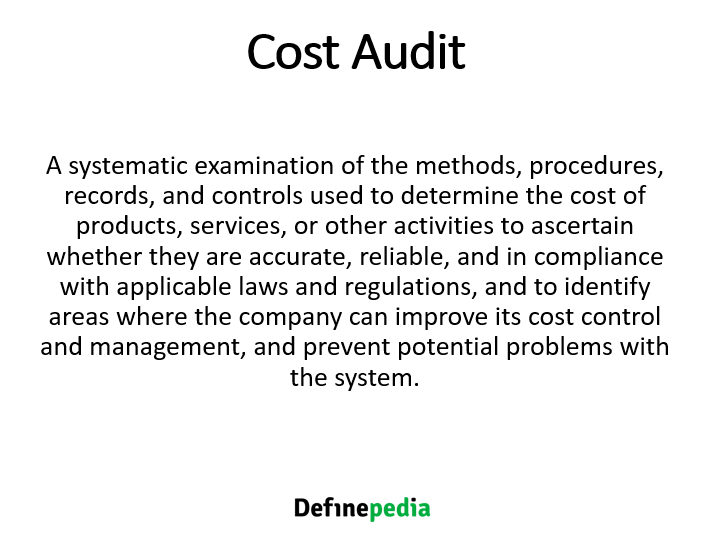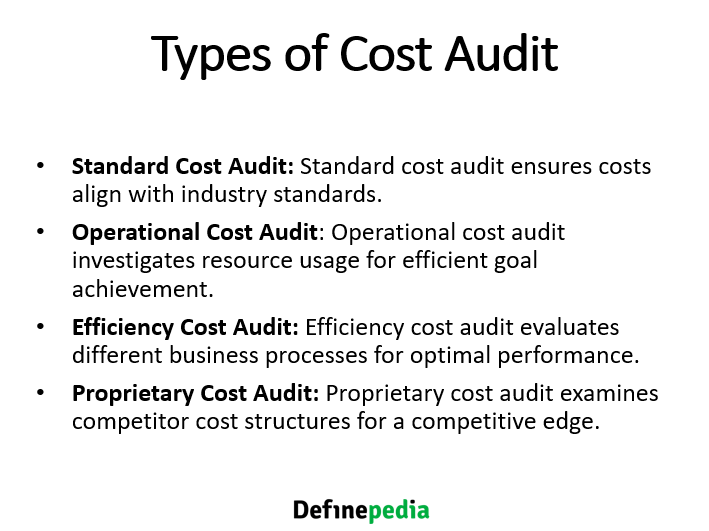Cost Audit Definitions
“A systematic examination of the cost accounting system and the underlying data to determine whether costs are being incurred in an efficient and economical manner.” – Charles T. Horngren, George Foster, and Srikant M. Datar
“A review of the methods, procedures, and records used to determine the cost of products, services, or other activities.” – Warren K. Arens, James K. Loebbecke, and Robert T. Elder
According to the American Institute of Certified Public Accountants, “An examination of the methods, records, and controls used to determine the cost of products, services, or other activities to ascertain whether they are accurate, reliable, and in compliance with applicable laws and regulations.” –

Objectives of Cost Audit
Compliance Objectives
Similar to following traffic rules, businesses must adhere to financial regulations. Cost audit ensures companies are on the right financial path. In detail we can say that These objectives are typically put or taken by government regulations, such as the Sarbanes-Oxley Act in the United States and in India The Companies Act, 2013 is the main law governing companies in India.
It requires certain companies to maintain cost records and to have their cost accounts audited by a Cost Accountant. The Companies (Cost Records and Audit) Rules, 2014 provide more detailed guidance on the requirements for cost records and cost audit.. Cost audits can help to ensure that the company is complying with these regulations, which can help to protect it from fines and penalties.
Constructive Objectives
Imagine building a structure – cost audit is like an architect, identifying areas for improvement to make businesses stronger. These objectives are focused on helping the company to improve its cost control and management. Cost audits can identify areas where the company is incurring unnecessary costs, or where it can improve its production processes to reduce price.
Preventative Objectives
Think of cost audit as a financial doctor’s check-up, anticipating potential issues and prescribing remedies before problems arise. These objectives are focused on anticipating and preventing potential problems with the company’s cost accounting system. Cost audits can identify potential problems early on, before they cause major financial losses.
Benefits of Cost Audit
- Financial Transparency: Basically, the cost audit lights up the financial landscape, making it transparent and helping businesses make informed decisions.
- Fraud Prevention: Like a powerful security guard, cost audit ensures that financial transactions are secure and free from fraudulent activities.
- Efficiency Boost: Consider cost auditing your business fitness coach. Basically, It identifies inefficiencies, transforming companies into lean and efficient performers.
Types of Cost Audit

- Standard Cost Audit: Imagine being a baking judge, assessing each cake against a perfect recipe. Standard cost audit ensures costs align with industry standards.
- Operational Cost Audit: Picture a detective at a crime scene, collecting clues. Operational cost audit investigates resource usage for efficient goal achievement.
- Efficiency Cost Audit: Pretend you’re a coach analysing a soccer game. Efficiency cost audit evaluates different business processes for optimal performance.
- Proprietary Cost Audit: Imagine being a strategic spy, studying rival organisations. Proprietary cost audit examines competitor cost structures for a competitive edge.
The Main Purposes of Cost Audit
- Accuracy and Fairness of Costing Data: Cost audit ensures that data related to production, operations, and processes is accurate and fair.
- Verification of Accounting Principles: It checks if a company’s books of accounts align with cost accounting principles.
- Detection and Prevention of Errors and Frauds: Cost audit acts as a vigilant guard, identifying and preventing errors and fraudulent activities in cost accounts.
- Inventory and Work-in-Progress Records: Proper records of inventory and work-in-progress are maintained, ensuring a clear financial picture.
- Determination of Actual Production Cost: Cost audit helps determine the real production cost, aiding in setting a fair selling price.
- Waste Minimization: By minimising wastage, cost audit optimises resource use and reduces production costs.
- Enhancing Business Productivity: Cost audit contributes to overall business productivity enhancement.
- Support for Decision Making: Relevant cost data from cost audit assists management in making well-informed decisions.
- Tax Data Provision: Cost audit provides essential data for tax purposes.
- Budgetary Control and Standard Costing: It facilitates the implementation of budgetary control and standard costing practices.
- Transparency for Investors: Cost audit offers investors a clear view of the business, fostering transparency.
- Worker Performance Improvement: By positively influencing morale, cost audit contributes to improved worker performance.
Was this helpful?
0 / 0